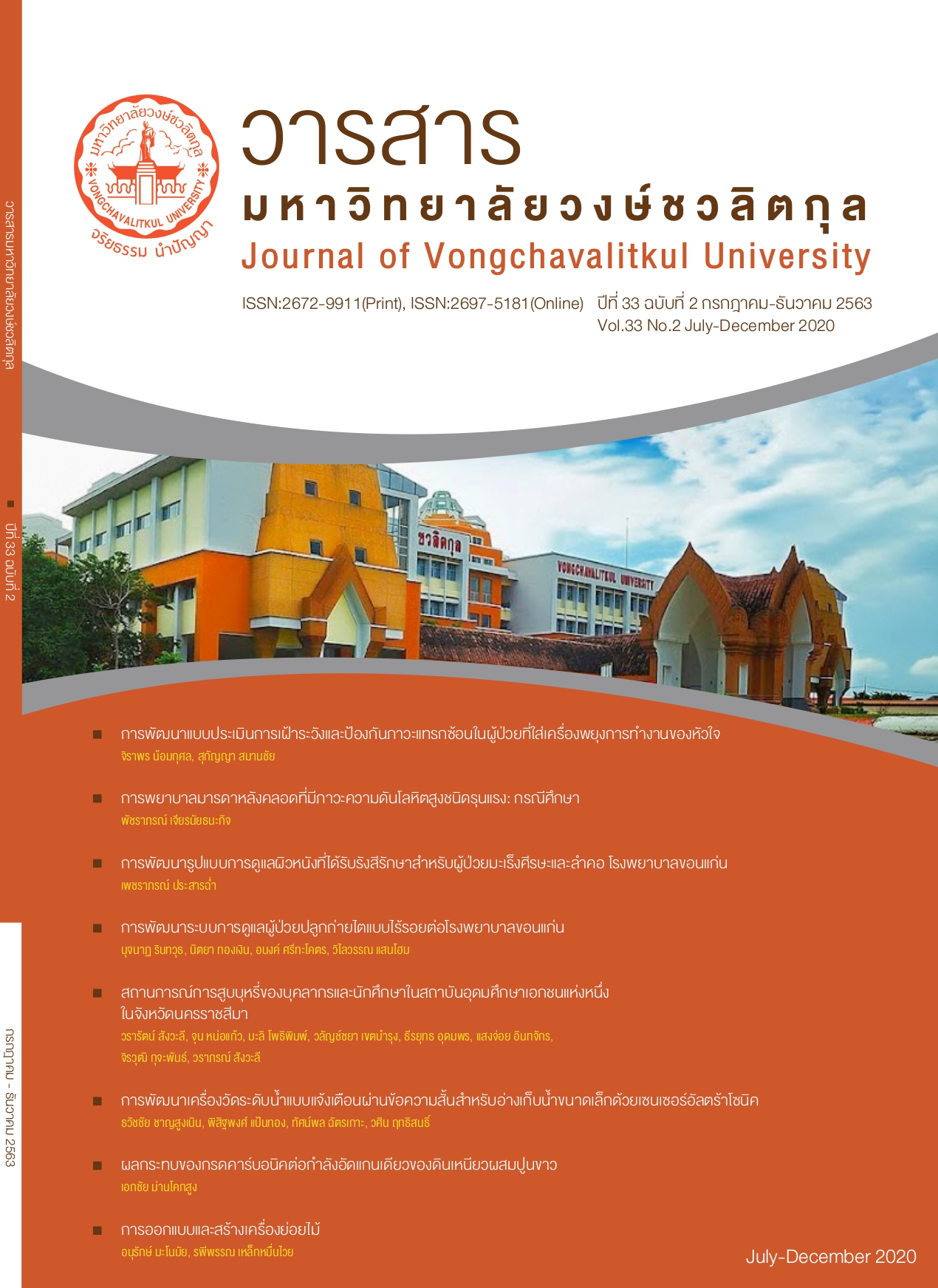Development of a Seamless Kidney Transplantation Patient Care System at Khon Kaen Hospital
Main Article Content
Abstract
Objective: This participatory action research intended to develop a seamless kidney transplantation patient care system of Khon Kaen Hospital.
Methods: Participants in the study composed of 26 selected multidisciplinary health care personnel and 26 kidney transplantation patients. The study conducted under four steps of work, 1) situation analysis and clarification of problems, 2) model development, 3) implementation of the developed model, and 4) evaluation. The study tools consisted of 2 parts. 1) The care system development tool was the existing Kidney transplantation patient care guidelines of the hospital and 2) the tools used for data collection included patient characteristic questionnaire, a test for knowledge and activities of pre and post-kidney transplantation, clinical indicators record sheet and the satisfaction questionnaire for patients and for service providers on the developed seamless kidney transplantation care system. Data were collected by observing and questioning and were analyzed by descriptive statistics: frequency, percentage, mean and standard deviation.
Results: 1) A seamless kidney transplantation patient care system model was developed. 2) Results of the model implementation showed that there was no surgical postpone caused by improper patient preparation. The incidence of complications from inappropriate behaviors after renal transplantation decreased from 21.24% to 14.28% and the average day of hospital stay decreased from 10 to 6 days. Graft survival rate and patient survival rate increased from 85.71% to 100%. Care providers have a clear guideline of practice and seamless collaborative network for continuous patient care.
Article Details
References
2. กัลปังหา โชสิวกุล, นพวรรณ เปียซื่อ และ สุรวิทย์ ศักดิ์ดานุภาพ. (2560). ผลของโปรแกรมการบูรณาการดูแลโดยทีมสหสาขาวิชาชีพร่วมกับการจัดการตนเอง ในผู้ป่วยโรคไตเรื้อรังที่มีปัญหาซับซ้อน. วารสารการพยาบาล, 32(4), 79-93.
3. คณะแพทยศาสตร์โรงพยาบาลรามาธิบดี. (2553). แนวปฏิบัติการผ่าตัดปลูกถ่ายไต คณะแพทยศาสตร์ โรงพยาบาลรามาธิบดี (ร่าง 2553). กรุงเทพมหานคร: คณะแพทย ศาสตร์รามาธิบดี.
4. งานเวชระเบียน โรงพยาบาลขอนแก่น. (2563). รายงานสถิติประจำปี (2559 - 2562). งานเวชระเบียนและสถิติโรงพยาบาลขอนแก่น.
5. ดารณี เทียมเพ็ชร์ และคณะ. (2558). การพัฒนาระบบการดูแลผู้ป่วยเบาหวานลงสู่ชุมชน แบบไร้รอยต่อ อำเภอเมือง จังหวัดสระแก้ว. วารสารพยาบาลกระทรวงสาธารณสุข, 25(3), 156-168.
6. ประเจษฎ์ เรืองกาญจนเศรษฐ์. (2562). การบริจาคไต Kidney Donation (พิมพ์ครั้งที่ 1). กรุงเทพมหานคร: หจก.โรงพิมพ์มิตรสยาม.
7. เพ็ญจันทร์ แสนประสาน, ดวงกมล วัตราตุลย์, ลัดดาวัลย์ เตชางกูร และ นวลใย นิลชาติ. (2560). ปัจจัยสนับสนุนระบบการดูแลแบบไร้รอยต่อ ของเครือข่ายการพยาบาลโรคหัวใจ. วารสารพยาบาลโรคหัวใจและทรวงอก, 28(2): 154–167.
8. สมาคมปลูกถ่ายอวัยวะแห่งประเทศไทย (Thai Transplantation Society). (2559). Transplantation Care ครั้งที่ 2 แนวทางการประเมินผู้บริจาคไต (Living Donor) เพื่อรอการปลูกถ่ายให้กับผู้ป่วยไตวายเรื้อรังระยะสุดท้าย. กรุงเทพมหานคร.
9. สมาคมปลูกถ่ายอวัยวะแห่งประเทศไทย (Thai Transplantation Society). (2560). รายงานข้อมูลการปลูกถ่ายอวัยวะประจำปี พ.ศ. 2560 (พิมพ์ครั้งที่ 1). กรุงเทพฯ: สำนักพิมพ์กรุงเทพเวชสาร.
10. สาวิตรี แสงศรี. (2562). การพัฒนาการวางแผนการจำหน่ายโดยครอบครัวมีส่วนร่วมในผู้ป่วยโรคไตเรื้อรัง. วิทยานิพนธ์ปริญญาพยาบาลศาตรมหาบัณฑิต สาขาการพยาบาลผู้ใหญ่, มหาวิทยาลัยขอนแก่น, ขอนแก่น.
11. โสภณ เมฆธน. (2560 ). ปาฐกถาเรื่อง การจัดการโรคไตเรื้อรังนำสู่การจัดการโรคไม่ติดต่อเรื้อรัง. ในการปาฐกถาเกียรติยศ ศ.นพ.วิศิษฏ์ สิตปรีชา การประชุมใหญ่ประจำปีสมาคมโรคไตแห่งประเทศไทย, 5 สิงหาคม 2560, ณ โรงแรมเซ็นทาราแกรนด์และบางกอกคอนเวนชันเซ็นเตอร์เซ็นทรัลเวิลด์ กทม. สืบค้นจาก https://www. hfocus.org/content/ 2017/08/14351
12. อดิศว์ ทัศณรงค์ และคณะ. (2562). ตำราการปลูกถ่ายอวัยวะ Textbook of Organ Transplantation (พิมพ์ครั้งที่ 1). กรุงเทพฯ: บริษัท เท็กซ์ แอนด์ เจอร์นัล พับลิเคชั่น จำกัด.
13. Meera, N. Harhay, et al. (2018). The Association of Discharge Decisions after Deceased Donor Kidney Transplantation with the Risk of Early Readmission: Results from the Deceased Donor Study. Clinical Transplantation, 32(4). สืบค้นจาก https://www.ncbi.nlm.nih.gov/pmc/articles/PMC5924427/
14. Katz, Daniel and Robert, L. Kahn. (1978). The social psychology of organization (2nded.). New York: John Wiley & son.


